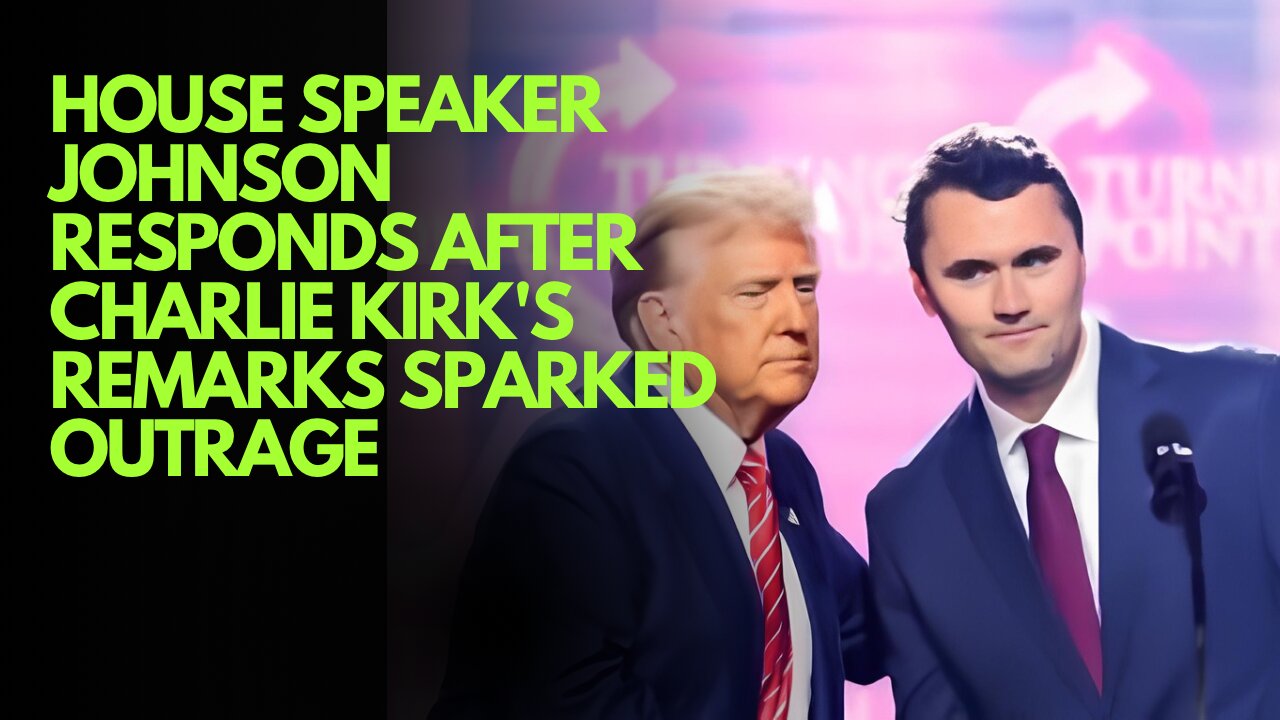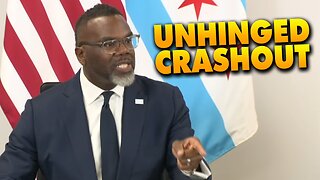Premium Only Content

House Speaker Johnson responds after Charlie Kirk's remarks sparked outrage
Speaker Johnson Strikes Back at Ilhan Omar After Charlie Kirk Remarks Ignite Outrage
In a sharp political clash, Speaker Mike Johnson has fired back at Representative Ilhan Omar in response to controversial remarks she made about Charlie Kirk—comments that have sparked widespread outrage across the political spectrum.
The dispute began when Ilhan Omar publicly criticized Charlie Kirk, the conservative activist and founder of Turning Point USA, following certain statements he made which she deemed inflammatory or harmful. While the exact content of Kirk’s remarks is under dispute, Omar accused him of promoting divisive rhetoric and questioned the legacy he was building. Her tone and content triggered a strong backlash from Republicans, conservative commentators, and some centrist voices as well.
Speaker Johnson wasted no time in defending Kirk. In a statement issued shortly after Omar’s remarks became public, Johnson called her comments provocative and irresponsible. “There is a line between free speech and incitement of division,” Johnson said, positing that Omar had crossed that line. He accused her of distorting Kirk’s views and misrepresenting his public record, insisting that Kirk has been a vocal advocate of conservative values and free speech, not one who seeks to sow hatred or discord.
Republican allies rallied around Johnson’s defense, framing the issue as part of a larger debate over political civility, accountability, and the boundaries of inflammatory language. Social media lit up with criticism of Omar’s wording, with many accusing her of using exaggerated rhetoric and of failing to engage in constructive dialogue. Others, however, pointed out that public figures on both sides often use provocative statements, suggesting that outrage about this incident may be selective or politically motivated.
On the other side, supporters of Ilhan Omar defended her right to critique public figures—including Kirk. They argued that her observations stemmed from longstanding concerns about how certain political activists address topics such as culture war issues, race, and social justice. Omar’s defenders contend that responses like hers are valid in a polarized environment where public dialogue often escalates quickly and messaging from all angles can be extreme.
Amid the cacophony, some political analysts have suggested that this incident underscores deeper fissures in the current political climate. It exemplifies how quickly statements can escalate into full-blown controversies, how media amplification magnifies them, and how responses are often tribal before they are deliberative. The episode also raises questions about whether public figures should be held to higher standards of speech, and whether political leaders have a role in reducing or inflaming divisions.
In sum, Speaker Johnson’s reaction to Ilhan Omar’s comments about Charlie Kirk highlights not only a direct confrontation between two prominent figures but also reflects broader tensions in U.S. political discourse. As the outrage continues to ripple through both social and mainstream media, the debate about what constitutes responsible rhetoric, and who gets to define it, remains very much alive.
-
 2:08:04
2:08:04
Tundra Tactical
9 hours ago $23.52 earned🎉 Pro-2A Party LIVE! | Gun Games, Freedom Vibes & Letting Loose 🔫🇺🇸
65.4K3 -
 5:21:52
5:21:52
Rallied
9 hours ago $6.55 earnedWarzone Challenges All Night
39.3K3 -
 2:45:52
2:45:52
DLDAfterDark
10 hours ago $15.40 earnedWhat Are We Missing From The Charlie Kirk Incident? Feat. TN Tactical - After Hours Armory Live!
45.2K11 -
 16:23
16:23
True Crime | Unsolved Cases | Mysterious Stories
1 month ago $6.74 earnedThe Strange Disappearance of Mekayla Bali | (Mini-Documentary)
41.4K7 -
 10:03
10:03
nospeedlimitgermany
13 days ago $9.83 earnedVW Golf 5 R32 | 250 PS | Top Speed Drive German Autobahn No Speed Limit POV
46.1K8 -
 1:35
1:35
Memology 101
1 day ago $8.85 earnedChicago Mayor Johnson calls LAW ENFORCEMENT a "SICKNESS" he will "ERADICATE"
53.5K50 -
 10:17
10:17
Advanced Level Diagnostics
13 days ago $8.73 earned2007 Chevy Express - Replaced Everything But The Code Remains!
47.9K1 -
 1:01:11
1:01:11
The Mel K Show
11 hours agoMel K & Harley Schlanger | History Repeats: A Wake-Up Call for Humanity | 9-20-25
112K30 -
 2:13:52
2:13:52
Mally_Mouse
19 hours ago🌶️ 🥵Spicy BITE Saturday!! 🥵🌶️- Let's Play: Lockdown Protocol (New Updates!)
100K6 -
 12:57
12:57
Culture Apothecary with Alex Clark
1 day agoMy Last 6 Years With Charlie Kirk | In Memoriam with Alex Clark
46.4K11